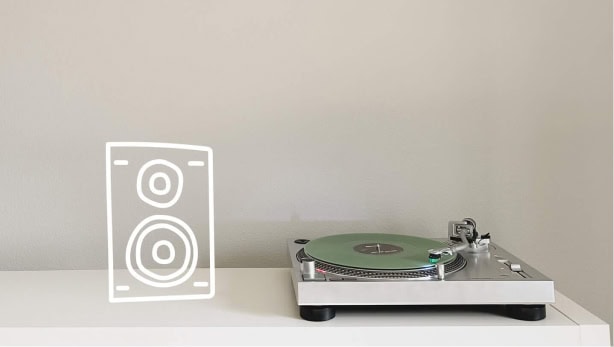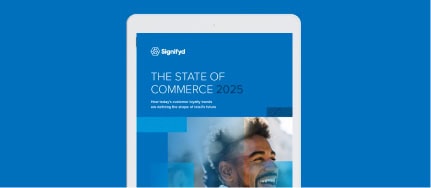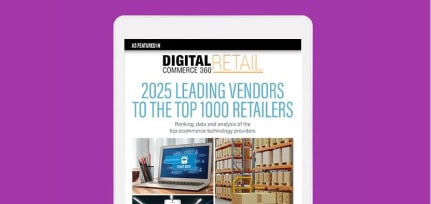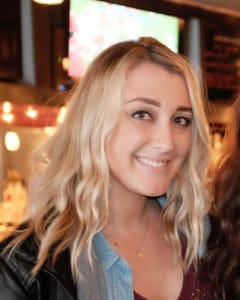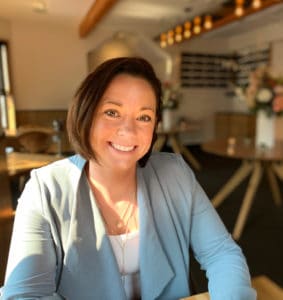To be successful in sales, you need the heart of a lion, the focus of a fighter pilot, the nerve of a high-wire walker, the mind of a chess master and a defined but unusual relationship with the word “no.”
“I think the biggest thing that I had to get over was rejection — just a no — and that shame or rejection that’s clouded around that,” says Signifyd Account Executive Leanne Mansfield. “If you can get past getting a ‘no,’ nothing will really be in your way to keep asking and keep knocking.”
Fellow Account Executive Mallory Ames says yes to no.
“I started off with the brutal sales jobs where you’re knocking on 65 to 80 doors a day and getting told no more times than you can think about,” she says. “But that built that callus, that unemotional attachment to the word ‘no.’ I just became unemotional about it and didn’t take it personally.”
It’s advice that budding sellers might want to take to heart. Mansfield and Ames are among Signifyd’s top account executives, bringing in millions of dollars worth of business and routinely winning recognition and topping the sales leaderboard. Also among the elite group is Isabell Mitchell, who was Signifyd’s No. 1 seller in 2020.
Gender diversity builds higher-performing sales teams
The trio is living-and-breathing evidence of long-running changes in the sales profession. Buyers no longer live at a disadvantage when it comes to information concerning available products and services. Business buyers typically have done extensive research and are well down their paths to purchase before they ever even talk with a salesperson. They are looking for a partner, a consultant, an expert who understands their businesses, their aspirations and their obstacles to greater success.
Given that, the sales profession is shaking off many of the old notions of the Glengarry-Glen-Ross variety. But sales remains a competitive, numbers-driven field in which males outnumber females, particularly in tech categories, where females hold 25% of sales jobs industry-wide.
The figure is discouraging, but also damaging to businesses. Xactly, a sales force data-management provider, found that 86% of women selling business-to-business hit their quotas, compared to 78% of men, according to the Harvard Business Review.
The low percentage of women selling technology-driven solutions comes as no surprise to Mitchell, who set a company record for booking deals last year. But she’s interested in helping improve the slow progress so far and to “inspire women who may not be in the tech industry at all to think outside the box and try something new. As we have seen, women are very successful at Signifyd and other tech companies.”
Mansfield, who played high school and club volleyball, literally trained to become a successful salesperson. It was in her blood; her grandfather was a salesman for paper company Crown & Zellerbach in the first half of the 20th century.
She started out in the hospitality industry, as an event planner and selling hotel rooms. She worked on a data team at Google for a stretch and went on to work as a sales development representative at a computer security company. She honed some sales basics there before connecting with some former Google co-workers who had landed at Signifyd.
“It’s so nice to rely on a product that works,” she says of selling Signifyd’s Commerce Protection Platform and it’s Fraud Protection, Abuse Prevention and Payments Optimization solutions. “I’ve had other jobs where I can’t guarantee that my product would solve my customers’ problems, so I wasn’t as happy as I am here at Signifyd.”
A sales career means controlling your own destiny
Ames, who’s based in Denver, was drawn by the sense of competition and earning potential that a sales career brings. Early on, the former collegiate soccer player launched her own business, coaching and conditioning young soccer players. For a time she had her sights set on a college coaching career but realized the time commitment and compensation for a college soccer coach were out of alignment.
And, she says, there is something about controlling your own destiny — being CEO of Mallory Enterprises, as she puts it.
“If I were in a job that had one set income, I don’t think I would necessarily stay motivated long-term,” says Ames, who started at Signifyd in March 2020. “I like the challenge of the sale. I like knowing that one more phone call, one more email, could be the game-changer; it could literally mean doubling my annual income. Really, one sale could do that. I love it because I know my work ethic, my natural ability and I know my ability to be a student.”
Being independent and responsible for figuring out the best approach to any given sale was a big draw for Mitchell, as well.
Selling Signifyd involves learning from — and educating — the world’s leading retailers
“It’s my job to quarterback these deals and to bring people in when they’re needed,” the New York-based Mitchell says of drawing on other Signifyd teams’ expertise. “Anything we execute to the prospect comes through the AE. I love that. I love getting my hands dirty and being in the deal and saying, ‘This is what we’re going to do.’”
And then there is the opportunity to talk to some of the most successful players in the retail field, which isn’t bad.
“I have direct conversations with C-level and corporate executives at some of the top online retailers in the world,” she says. “People trust what I say and I’m looked at as a consultant. Having other people’s faith in me has been very rewarding.”
Add to all that, being able to demonstrate that the world is changing and who does what in the world is changing with it.
“It’s cybersecurity,” Mitchell says. “That is really cool being a female in cybersecurity. I think that’s exciting when you think about the fact that there are few women in STEM professions.”
None of which is to say that anyone can sell. In fact, it takes a special breed and a lot of work, particularly selling innovative technology-based products to another business.
“I think sales sometimes gets a bad rap, that anyone can do it,” Mitchell says. “That’s not the case with this kind of selling. This kind of selling, it’s intricate. It requires brainpower. Every Signifyd deal is different. There is no formula. Not a single deal that I’ve sold is the same.”
Ames, Mansfield and Mitchell are unanimous on that count.
Not surprisingly, when asked, all three sales veterans say they do have advice for those just starting out in sales or considering a career in sales.
Top sales professionals offer their best advice
“If you just come in and deliver your number and just keep on keeping on. That’s the golden rule of sales,” says Mansfield, who joined Signifyd three years ago. “Make your number, deliver your metrics and keep going until you get there and have that blinder mentality about it.”
Sure, it can be easier said than done. There will be deals you lose, she says. Sometimes you won’t know why. Sometimes it doesn’t make sense.
You need to talk to yourself: “It might not be this deal,” Mansfield says. “I’ll get the next deal. And don’t wallow in any kind of failure and let it define you for that entire quarter. You just have to keep going and not get too distracted by anything you can’t control.”
Ames’ advice to women trying to get into sales is that how you present yourself is key.
“Get educated on how to communicate clearly and concisely and effectively so that people take you seriously,” she says. “Work towards your strengths and don’t be afraid to work with other colleagues to get deals done.”
And however it goes, remember, there will always be a next deal.
Mitchell says that it’s important for female sellers to keep in mind that there is no one thing a successful sales person looks like — or does for that matter.
“I think it can be kind of difficult at times to not feel the imposter syndrome,” says Mitchell, who joined Signifyd two and a half years ago.
Some inexperienced sellers might think it takes years of experience to get it right or that you need to have experience at certain marquee companies.
There is no one right way to sell
“There are no preconceived notions of how to sell. There are a lot of different schools of selling. I come at it with a completely open mind,” she says. “People looking at this, seeing who’s been successful at Signifyd, women especially can see that you don’t have to have x number of years experience and you don’t need to be working at x company to be successful.”
Another tip? Keep learning, all three women say.
For her part, Mansfield finds herself going back to lessons learned on the volleyball court to stay on top of her sales game.
“If I wanted to be better at volleyball, I had to stay after practice and work on my form,” says Mansfield, who’s based in San Jose. “You have to put the work in, and that’s the same. When I sell I sometimes find myself saying, ‘I need to watch some old training videos.’ I need to keep myself always sound on certain strategies or training. I can’t just do the same thing all the time and expect to be as successful. You always have to train yourself or improve yourself.”
For Mitchell, it’s ballet — 18 years of pre-professional classical ballet, dancing 25 hours a week. It’s a reminder of where perseverance, challenging oneself and sometimes just grinding it out can get you. And no, it’s not too much of a stretch to see an enterprise sales cycle as an intricate ballet, requiring grace, strength, self-awareness, endurance and an appreciation of your audience.
Says Ames: “I read a ton. I read so many books, John Maxwell books on communication, different sales books, Carnegie. I have like 50 books that I have that I read through. And that helped me a lot to learn the mindset and the psychology of what you’re doing; why you’re doing it and why anyone would want to buy from you rather than from somebody else.”
All of the training and practice and research helps build an approach to selling — almost a philosophy of selling.
“I can sometimes sell on relationships, which can be tricky,” Mansfield says. “Sales can tend to rely on product features and capabilities, but forget taking the time to understand who the buyer is. At the end of the day, I’m selling to a person and I’m selling to solve a problem for that person. I really hone in on the relationship and that’s where I get a lot of confidence.”
She says she aims to become the go-to person for the champion or advocate that she is working with while selling to a prospective customer’s broader buying team.
You don’t sell to companies; you sell to people
“Sometimes I think salespeople can forget about that relationship muscle and just be about, ‘We’re going to increase you by this or that percent,’” Mansfield explains. “The math matters and the value-add matters as well, but I feel that if you don’t connect to your buyers, there is an element where there is no personal tie to you.”
Building those sorts of relationships is a lot easier, all three women agree, when you’re selling a product that you know will benefit the enterprise you are selling it to. In fact, all three said that is why they chose to work for Signifyd and why they’ve had such success with the company.
“Honestly, from the beginning process of interviewing with Signifyd to now working for Signifyd, it’s the best choice I ever made,” Ames says. “I don’t feel like I ever have to sell the product. Once I can educate someone on what the product can do, then it’s a no-brainer. I don’t feel like I’m convincing someone and then I walk away thinking they didn’t really need that. Everyone who is selling something online needs our product. I’m offering them an incredible solution that can basically make their company and their success.”
Mitchell says a key to selling success is to learn everything about what you’re selling, believe in it and say what you believe.
“That’s why I love Signifyd. I truly believe in the product. I believe everything I’m saying,” she says. “If you can’t believe in the product, you’re not in the right position.”
Which, come to think of it, adds one more thing you need to be a successful salesperson. Yes, heart, focus, nerve, brains, an immunity to “no” — and a product that works while eliminating painful barriers to success.
Photo by Getty Images
Want to learn more about our team? Let’s talk.


